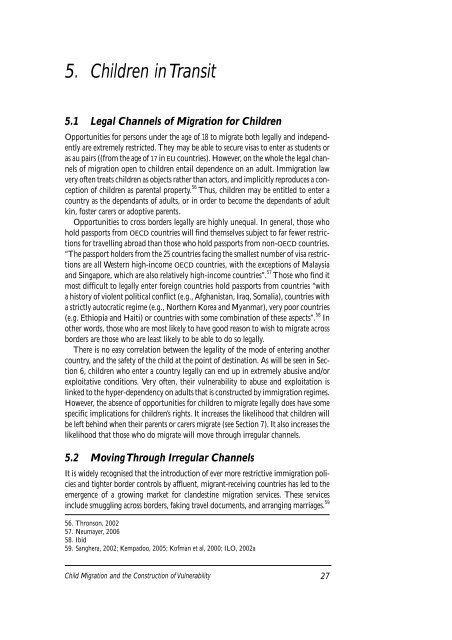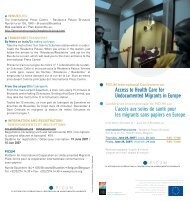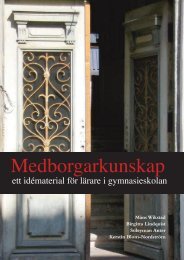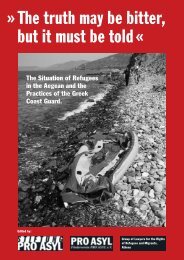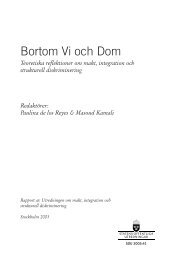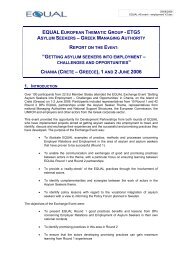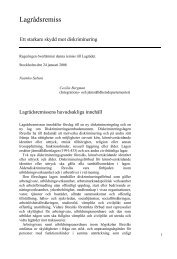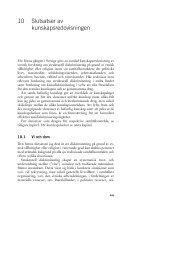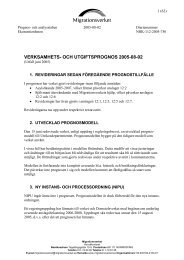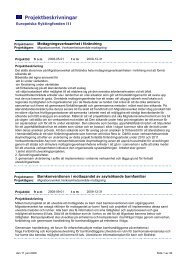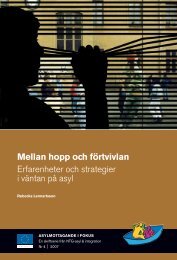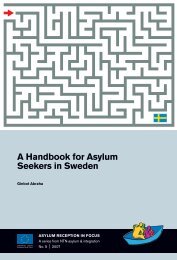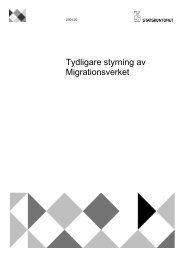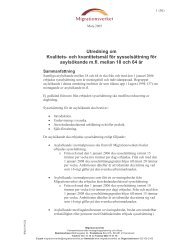and the Construction of Vulnerability - Child Trafficking
and the Construction of Vulnerability - Child Trafficking
and the Construction of Vulnerability - Child Trafficking
You also want an ePaper? Increase the reach of your titles
YUMPU automatically turns print PDFs into web optimized ePapers that Google loves.
5. <strong>Child</strong>ren in Transit<br />
5.1 Legal Channels <strong>of</strong> Migration for <strong>Child</strong>ren<br />
Opportunities for persons under <strong>the</strong> age <strong>of</strong> 18 to migrate both legally <strong>and</strong> independently<br />
are extremely restricted. They may be able to secure visas to enter as students or<br />
as au pairs ((from <strong>the</strong> age <strong>of</strong> 17 in EU countries). However, on <strong>the</strong> whole <strong>the</strong> legal channels<br />
<strong>of</strong> migration open to children entail dependence on an adult. Immigration law<br />
very <strong>of</strong>ten treats children as objects ra<strong>the</strong>r than actors, <strong>and</strong> implicitly reproduces a conception<br />
<strong>of</strong> children as parental property. 56 Thus, children may be entitled to enter a<br />
country as <strong>the</strong> dependants <strong>of</strong> adults, or in order to become <strong>the</strong> dependants <strong>of</strong> adult<br />
kin, foster carers or adoptive parents.<br />
Opportunities to cross borders legally are highly unequal. In general, those who<br />
hold passports from OECD countries will find <strong>the</strong>mselves subject to far fewer restrictions<br />
for travelling abroad than those who hold passports from non-OECD countries.<br />
“The passport holders from <strong>the</strong> 25 countries facing <strong>the</strong> smallest number <strong>of</strong> visa restrictions<br />
are all Western high-income OECD countries, with <strong>the</strong> exceptions <strong>of</strong> Malaysia<br />
<strong>and</strong> Singapore, which are also relatively high-income countries”. 57 Those who find it<br />
most difficult to legally enter foreign countries hold passports from countries “with<br />
a history <strong>of</strong> violent political conflict (e.g., Afghanistan, Iraq, Somalia), countries with<br />
a strictly autocratic regime (e.g., Nor<strong>the</strong>rn Korea <strong>and</strong> Myanmar), very poor countries<br />
(e.g. Ethiopia <strong>and</strong> Haiti) or countries with some combination <strong>of</strong> <strong>the</strong>se aspects”. 58 In<br />
o<strong>the</strong>r words, those who are most likely to have good reason to wish to migrate across<br />
borders are those who are least likely to be able to do so legally.<br />
There is no easy correlation between <strong>the</strong> legality <strong>of</strong> <strong>the</strong> mode <strong>of</strong> entering ano<strong>the</strong>r<br />
country, <strong>and</strong> <strong>the</strong> safety <strong>of</strong> <strong>the</strong> child at <strong>the</strong> point <strong>of</strong> destination. As will be seen in Section<br />
6, children who enter a country legally can end up in extremely abusive <strong>and</strong>/or<br />
exploitative conditions. Very <strong>of</strong>ten, <strong>the</strong>ir vulnerability to abuse <strong>and</strong> exploitation is<br />
linked to <strong>the</strong> hyper-dependency on adults that is constructed by immigration regimes.<br />
However, <strong>the</strong> absence <strong>of</strong> opportunities for children to migrate legally does have some<br />
specific implications for children’s rights. It increases <strong>the</strong> likelihood that children will<br />
be left behind when <strong>the</strong>ir parents or carers migrate (see Section 7). It also increases <strong>the</strong><br />
likelihood that those who do migrate will move through irregular channels.<br />
5.2 Moving Through Irregular Channels<br />
It is widely recognised that <strong>the</strong> introduction <strong>of</strong> ever more restrictive immigration policies<br />
<strong>and</strong> tighter border controls by affluent, migrant-receiving countries has led to <strong>the</strong><br />
emergence <strong>of</strong> a growing market for cl<strong>and</strong>estine migration services. These services<br />
include smuggling across borders, faking travel documents, <strong>and</strong> arranging marriages. 59<br />
56. Thronson, 2002<br />
57. Neumayer, 2006<br />
58. Ibid<br />
59. Sanghera, 2002; Kempadoo, 2005; K<strong>of</strong>man et al, 2000; ILO, 2002a<br />
<strong>Child</strong> Migration <strong>and</strong> <strong>the</strong> <strong>Construction</strong> <strong>of</strong> <strong>Vulnerability</strong><br />
27


